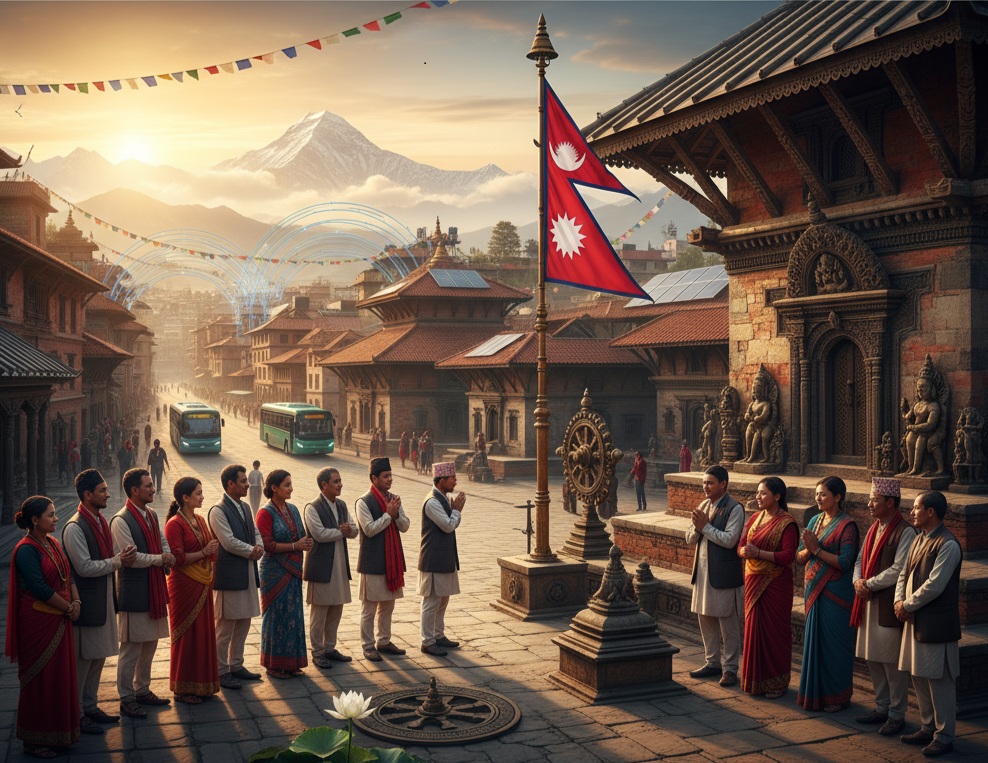
Unity, Civility, and Modernization for Nepal
Unity, civility, and modernization represent three interdependent foundational elements upon which Nepal's sustainable development and progress pivot.
A nation's capacity to navigate complex societal and political transitions hinges upon its ability to forge a cohesive national identity while fostering respectful public discourse and embracing technological and institutional advancement.
These three pillars do not operate in isolation; instead, they function in a symbiotic relationship, where the success of one profoundly influences the others. It needs to explore how Nepal's historical journey, contemporary challenges, and future aspirations all reflect the critical interplay between forging national unity, cultivating a civil society, and pursuing comprehensive modernization.
Nepal's quest for unity constitutes a complex historical endeavor, given its profound ethnic, linguistic, and regional diversity. While the 18th-century unification campaigns forged a singular state from numerous principalities, this process did not always accommodate the pluralism of its diverse population. The transition to a federal republic in recent era represented a pivotal attempt to reconcile this tension, decentralizing power and providing greater political representation to various groups.
However, ongoing political instability and factionalism among major parties often exploit these differences for electoral gain, hindering true national cohesion. This political fragmentation, as evidenced by frequent coalition shifts, impedes long-term policy formulation and execution, undermining the collective will necessary for shared national goals.
Building a civil society requires a deep-seated commitment to respectful public engagement and democratic norms. The proliferation of civil society organizations (CSOs), with thousands contributing to social development since the 1990s, signifies a growing civic consciousness.
Yet, reports from organizations like Freedom House indicate that while political violence has declined, challenges persist concerning freedom of expression and the rule of law. Political polarization continues to fracture public trust, a critical component of civility.
The persistent tendency of political elites to engage in perpetual coalition-making, as noted in analyses from sources such as the Hudson Institute, diverts energy away from addressing systemic issues and instead fuels a climate of mutual distrust, eroding the foundation for a collaborative society.
The journey toward modernization has yielded both significant achievements and persistent obstacles. Nepal’s digital landscape is rapidly expanding; World Bank data reveals a significant increase in broadband penetration, with over 90% population penetration based on total subscribers as of now.
The government’s "Digital Nepal Framework" and initiatives like the Nagarik App demonstrate a commitment to digital governance and service delivery. However, challenges endure, including a lack of higher-level technical skills and fragmented digital infrastructure.
Moreover, while gross domestic product (GDP) per capita has increased to approximately $1,290 in 2024, the economy remains heavily reliant on remittances (constituting over 33% of GDP in 2024), indicating a fragile economic base and a substantial need for diversified, technology-driven growth.
The synergy between these three elements propels national development. Without national unity, modernization efforts risk uneven distribution of benefits, exacerbating regional and ethnic disparities. The lack of a unified national vision prevents the consistent, long-term policy implementation required to sustain large-scale infrastructural and economic projects.
Similarly, without civility, political discourse degenerates, obstructing the collaborative processes essential for formulating effective policies on modernization. For instance, debates surrounding large hydropower projects or digital infrastructure require respectful dialogue among diverse stakeholders to ensure equitable and sustainable outcomes. Political civility, therefore, acts as a lubricant for the gears of modernization.
Conversely, modernization can reinforce unity and civility. A robust digital infrastructure, for example, can connect disparate communities, fostering shared knowledge and cultural exchange, thereby strengthening national bonds. Transparent digital governance systems, like the Nagarik App, enhance citizen trust in state institutions, rebuilding the social contract and promoting civility.
Economic modernization, when pursued inclusively, reduces poverty and inequality, addressing root causes of social tension and providing a shared sense of progress that reinforces a cohesive national identity. The successful implementation of large-scale development projects, such as those that the Nepali Army has contributed to in the UN peace-keeping missions across the various conflict-ridden parts of the world, can become sources of collective national pride.
Hence, unity, civility, and modernization are not mere objectives but interconnected forces shaping Nepal's trajectory. Cultivating unity and civility provides the social and political stability necessary for sustained economic and technological advancement.
In turn, modernization, when pursued with a commitment to equity and inclusivity, strengthens national bonds and fosters a more respectful society. Nepal's future success depends on its leaders and citizens alike consciously recognizing and nurturing this vital relationship, collectively navigating its multifaceted challenges to build a prosperous, harmonious, and modern state.